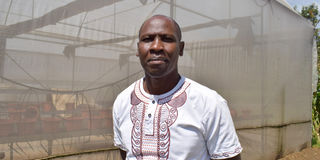Joseph Ng'aari: Union will reduce exploitation of pyrethrum farmers

Nakuru Pyrethrum Growers Union Chairperson Joseph Ng'aari during the interview on November 31, 2024.
The push to revive pyrethrum has gained traction as agrichemical manufacturers increasingly gravitate toward products with low mammalian toxicity and zero-residue bio pesticides.
The traction has since led to the formation of the Nakuru Pyrethrum Growers Union which is aimed at bringing together Pyrethrum farmers to increase the bargaining power of their flowers.
According to the Union's Chairperson, Joseph Ng'aari, the union was formed one year ago to bring together pyrethrum farmers from the eight pyrethrum-growing sub counties.
"Most pyrethrum farmers are working alone making it easy for them to be easily manipulated when they are selling their flowers," he shares.
Ng'aari says that the union has brought together individual cooperatives where the leadership of the union is elected from the cooperative. So far the Union has four cooperatives with four more at the advanced stage of registering to be members
He notes that the union will ensure farmers increase their income from the flowers by securing favourable markets for them.
"Right now, most farmers work individually with processors, and they are buying the flowers per kg where the price ranges between Sh. 250 and Sh. 200 per kg," he says.
He highlights that the union is working to have the farmers sell their flowers depending on the level of the pyrethrin content in their flowers.
"When farmers sell the flowers depending on the pyrethrin content they can sell up to Sh. 600 per kg which is triple the current rate," he says.
He adds that through the union, it can be easy to champion for rights of the farmers since they will have numbers while also being able to present proposals for potential funding
Ng'aari reveals that they are seeking to have a value-addition centre owned by the union by making sunflower by products, which will help them increase more sources of income while also creating employment opportunities for young people.


